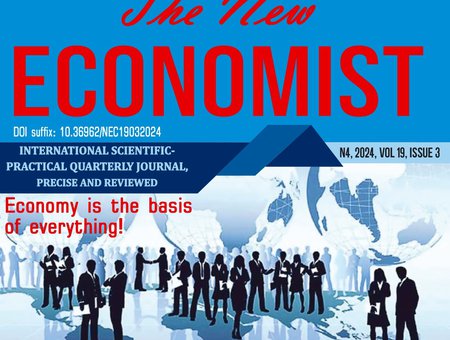The importance and benefits of the EU single market for Georgia
Shota Veshapidze
Doctor of Economic Sciences, Associate Professor, Ivane Javakhishvili Tbilisi State University

Sopiko Kitashvili
Master’s student Ivane Javakhishvili Tbilisi State University
Abstract
Relevance of the topic: The European Union's (EU) Single Market is one of the most integrated and competitive economic regions in the world. As countries in the EU's neighborhood, such as Georgia, seek closer economic ties with the Union, understanding the dynamics of the Single Market and its implications becomes increasingly crucial. Georgia, with its strategic geopolitical position and aspirations for deeper integration with the EU, presents a unique case for studying the potential benefits, challenges, and opportunities of aligning with the EU Single Market. Purpose of the article: The primary aim of this article is to analyze the implications of Georgia's potential integration with the EU's Single Market, exploring the benefits, challenges, and policy recommendations for enhancing Georgia's economic cooperation with the EU. Scientific work topic: This research examines the intersection of EU economic integration, particularly the Single Market, and the challenges faced by Georgia in aligning its economy with EU standards. The study focuses on trade, regulatory alignment, and sectoral opportunities for Georgia in the context of EU integration. Research object: The object of this study is the economic relationship between Georgia and the European Union, specifically Georgia's participation in the EU Single Market and the policies that could facilitate its closer integration. Research methods: The research employs a combination of qualitative and quantitative methods, including a review of existing literature, policy analysis, case studies, in both Georgia and the EU. Statistical data on trade flows, regulatory changes, and economic performance are also analyzed to support the findings. Practical significance: This article provides policymakers, business leaders, and academics with insights into the practical steps Georgia needs to take to deepen its economic ties with the EU. It offers recommendations for aligning Georgian regulatory frameworks with EU standards and fostering a more robust trade relationship. Results and discussion:
The analysis shows that Georgia stands to gain significantly from deeper integration with the EU Single Market, especially in sectors like agriculture, manufacturing, and services. However, significant challenges remain, particularly in terms of regulatory harmonization, infrastructure development, and overcoming non-tariff barriers. Additionally, the article discusses the political dynamics influencing Georgia's EU aspirations and how these might impact future integration prospects. Conclusion: Georgia's closer integration with the EU Single Market offers significant opportunities for economic growth, regulatory modernization, and enhanced trade relations. However, to fully realize these benefits, Georgia will need to continue implementing reforms, aligning its regulatory frameworks with EU standards, and addressing political and economic barriers that could hinder progress. Future research should focus on sector-specific analyses and the long-term impacts of EU integration on Georgia’s economy.
References
- Abesadze, R. (2022). The main directions of the Innovation Development Strategy of the Georgian Economy. Ekonomisti (2). 22-30. (In Georgian)
- Abuselidze, G. (2021). Competitiveness analysis of the georgian transport and logistics system in the black sea region: challenges and perspectives. In Computational Science and Its Applications–ICCSA 2021: 21st Inter¬national Conference, Cagliari, Italy, September 13–16,2021, Proceedings, Part IV 21 (pp. 133-148). Springer International Publishing.
- Gaghanidze, G. (2019), Export Growth: The Necessity of Creating New Export Products. (In Georgian).
- Kapanadze, S. (2006) EU Policy 46-51 (In Georgian)
- Papava, V. (2020). Becoming European: Challenges for Georgia in the Twenty-First Century. Universe. Bloomington.
- Papava, V. (2020a). Georgia’s European Way During the Period of Pandemic Deglobalization. Rondeli Blog, August 6, https://gfsis.org.ge/blog/view/1091.
- Putkaradze R. (2019). Georgia in the European Union’s Eastern Partner¬ship Countries:Historical Aspects and Challenges. Journal, Ecoforum Jour¬nal. Volume 8, Issue 1(18).
- Shengelia, T., & Berishvili, K. (2024). World trends of small business development and the reality of Georgia. Research Reviews, (5).
- Silagadze, A. (2022). Contemporary Global Economic Trends: Transitional Economies during Covid- Depression. Bull. Georg. Natl. Acad. Sci, 16(3).
- Veshapidze, S. (2017). The traditions orientated on European values in Georgia. Sciences of Europe 13-4 (13): 14-18.
- Veshapidze, S., & Karchava, L. (2022). Contradictions of Globalization under the COVID-19 Pandemic. Bull. Georg. Natl. Acad. Sci, 16(4), 152-157.
- Veshapidze, S., & Kitashvili, S. (2024). GEORGIA'S EUROPEAN INTEGRATION PERSPECTIVE. EKONOMISTI, #2, 94-112. (In Georgian)
- Veshapidze, S., & Megreladze, G. (2024). Prospects for the development of Georgia's trade with the European Union. The New Economist, 19(2), 11-223
- Zoidze, G., & Veshapidze, S. (2022a). The Modern Economy and Values. Cambridge Scholars Publishing. P. 125;
- Zoidze, G., & Veshapidze, S. (2022). Transformation of economic policy priorities under COVID-19. Three Seas Economic Journal, 3(2), 35-43.
- Abashmadze, R., Muradian, E. (2024). Georgia in 2023. Report on the Country’s Economy. Georgia in 2023: Report on the Country’s Economy - PB Services Georgia
- Georgia’s foreign trade in 2023. Ministry of Economic and Sustainable Development. ftt_2023.pdf (economy.ge). (In Georgian).
- An official website of the European Union. EU Single Market. EU Single Market Programme 2021-2027. https://www.consilium.europa.eu/en/policies/deeper-single-market/#:~:text=It%20guarantees%20that%20goods%2C%20services,them%20with%20better%20job%20opportunities.
- An official website of the European Union.EU Trade Relationships by country/region. Georgia. EU trade relations with Georgia. Facts, figures and latest developments.https://policy.trade.ec.europa.eu/eu-trade-relationships-country-and-region/countries-and-regions/georgia_en
- DCFTA Communication Manual for Georgia. (In Georgian) https://gip.ge/wp-content/uploads/2022/04/390169701-DCFTA-%E1%83%98%E1%83%A1-%E1%83%A1%E1%83%90%E1%83%99%E1%83%9D%E1%83%9B%E1%83%A3%E1%83%9C%E1%83%98%E1%83%99%E1%83%90%E1%83%AA%E1%83%98%E1%83%9D%E1%
21. DCFTA For Business. How to trade with The EU. Rates. (In Georgian) https://dcfta.gov.ge/ge/dcfta-for-businness
22. European Commision . Antitrust: Commision imposes 899 million euros penalty on Microsoft for non-compliance with March 2004 decision. ec.europa.eu/commission/presscorner/detail/en/ip_08_318
23. Fontaine, P. How Does EU work 6, 21-23 (In Georgian). https://infocenter.gov.ge/wp-content/uploads/2021/07/12-gakvethili-evrokavshiris-shesakheb.pdf
24. Ministry of Economy and Sustainable Development of Georgia. Small and medium entrepreneurship development strategy of Georgia – 2021-2025. (In Georgian). https://www.economy.ge/uploads/files/2017/ek__politika/sme_strategy/sme_development_strategy_2021_2025_.pdf
The New Economist, N 4 (2024), Vol. 19, Issue 3

14/01/2025
Copyright (c) 2025 Shota Veshapidze, Sopiko Kitashvili

This work is licensed under a Creative Commons Attribution-NonCommercial-NoDerivatives 4.0 International License.
